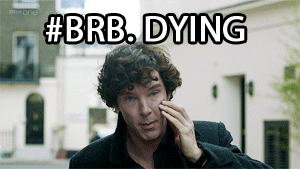The diseases you’re going to get

When I was in college, I was living on my own in a little apartment and had to commute into the university (about 30 miles) every day. The commute wasn’t bad. In fact, I spent most of my day at the university, going back to the apartment late in the evening. Those were the days when I could sleep four hours and feel perfectly fine. (Nowadays, I need at least 6 hours of sleep. Anything less than that and I’m a total grump.)
One day, I noticed that I was particularly tired, even with a good night’s sleep. I noticed that I was falling asleep in class, and that my muscles were achy although I didn’t play soccer the day before. I just didn’t feel right. By the end of the day, my throat was killing me, and my entire body was in pain. I crawled back to the apartment and into bed.
Two days later, a friend came knocking on my door. When I didn’t answer, he decided to take a peek through the window. My car was outside, but I didn’t answer the door. The air conditioner was on, so I was home. But I had not been to class in those two days, missing a midterm exam. When he looked through the window, he saw that I was splayed out on the tile floor of my bedroom, with a pillow under my head and wearing only a pair of shorts.
When he finally woke me up, we drove together to the student clinic at the university. Sure enough, I had the flu… The good, old-fashioned flu. I’d been having fevers, so I’d crawl in bed and cover myself. Then the fever broke and I’d get hot and laid on the floor. The nurse practitioner who saw me at the clinic told me to stay hydrated, stay home, and to not come back to school until the following week. She also gave me a note for my missed exams, which I was able to take when I returned.
That was one of about five times in my life that I’ve had the full-blown flu. Other times, I’ve had bad colds. But I remember the difference between the two enough to know when I’ve had the flu and when I’ve had a cold. It’s also the reason why I get the yearly flu vaccine.
In fact, I got the flu this past winter, while I was in Puerto Rico. Everyone around me seemed to have gotten it. We were all feeling crappy, with sore throats that mutated into coughs. As I sat in an overcrowded emergency room, I saw person after person come in with symptoms similar to mine. We all must have looked very miserable. After a breathing treatment to ease up the cough and congestion, and some acetaminophen for the fever, I went back to the hotel and slept for a couple of days. It would be weeks before the cough went away.
The thing about being sick is that you don’t treasure and acknowledge when you’re healthy, but you do very much remember when you’re sick. When you can’t be comfortable and feel miserable, you remember that. When you can’t do the things you enjoy doing, you remember those times as well. In essence, health you forget and illness you remember.
A variation of this is “recall bias” in epidemiological studies. You have two mothers: One whose child is afflicted with a congenital disease/condition and another with an otherwise healthy child. If you were to interview both mothers, on average, the mothers with a child with a disease/condition are more likely to remember exposures they had during pregnancy. Even if both mothers had the same exposures, the differences in recall can bring about the wrong conclusions.
Last year, when dad came down with colon cancer, part of me felt incredibly worries about how his life was about to change. The surgery left him with a colostomy, a hole on the side of his abdomen through which his large intestine would empty. This led to months of having to change the bags and clean the area, not to mention the recovery time after the surgery. The cancer had taken a lot from him in terms of his health and his strength. The man I saw lifting engine blocks to impress his friends was reduced to skin on bones.
Amazingly, he adapted to the situation. He learned to change the bag and clean the surgical site. He got on with the business of life. Eventually, he gained back his weight, and he was strong enough for the colostomy reversal surgery this past March. (It was a very long and complicated surgery.) He recovered from that surgery very well, driving himself home three days after it. (Yeah, the man heals fast.) Even with a huge scar and more recovery time, he adapted to it all just fine.
That’s what humans do. We adapt to the times when we’re not 100% healthy and get on with life. Most of us do, anyway. That’s why people go to work when they’re sick. They figure that they might as well be productive and miserable at work instead of just miserable at home… And they get the rest of us sick. I sincerely believe that epidemics would be much shorter and not as severe if people stayed at home when they got sick.
So, yeah, you’re going to get sick. Chances are that you’re going to be okay and recover. If you don’t, chances are that you’ll adapt… And you’ll get on with the business of living.